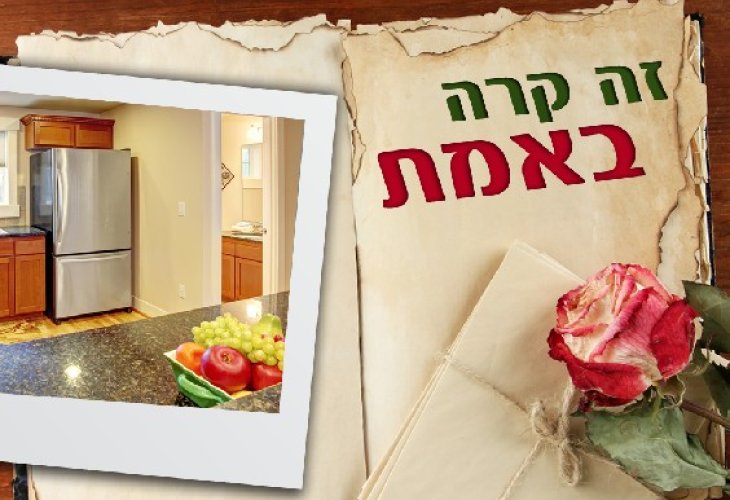Personal Stories
A Nun’s Test of Shabbat and a Quiet Kiddush Hashem
A Catholic nurse quietly challenges a Jewish family’s observance and finds herself changed by their commitment to Shabbat and love for Hashem

"Mom!" Suzie, the oldest daughter, called out from the kitchen, her voice tight with alarm. "Someone unplugged the refrigerator!"
At first glance, it might not seem like a big deal. But this wasn’t an ordinary moment, it was Friday night, right after Kiddush, when the family was sitting at the Shabbat table, ready to enjoy the first course: the salads, all stored in the fridge.
Madame Kisous rushed into the kitchen. “I can’t believe it,” she said softly, seeing the refrigerator plug dangling loosely beside the outlet.
“The salads are fine for now,” she reassured. “We can eat them.”
“Yes,” Suzie agreed, “but it’s hot. By tomorrow, everything will spoil.”
The family sighed. The bubbling Moroccan skhina (a Sephardic version of cholent) sat safely on the plata, the hotplate but the salads, desserts, chicken, and fish in the fridge and freezer would probably be ruined by the next day.
The Kisous family lived in Marseille, France, and had no Jewish neighbors they could turn to for help. But this was Shabbat. No one would plug the fridge back in until after nightfall on Saturday.
They accepted the situation without complaint. Madame Kisous gently gathered the children back to the table. “Let’s keep singing,” she encouraged.
Shabbat at the Kisous home was never quiet. Their warm table always had guests especially Jewish students studying in Marseille, who found comfort and Jewish connection in the Kisous home. It was a joyful house, despite the fact that Madame Kisous was a widow and her youngest daughter, Sylvie, was severely ill.
Sylvie suffered from muscular dystrophy, a serious and progressive disease. In France, children with serious illnesses were assigned personal nurses, often Catholic nuns. Sylvie’s caregiver was Sister Sophie, a kind, quiet nun who formed a deep bond with Sylvie.
Sister Sophie followed the family’s many customs without question. She helped Sylvie wash her hands before meals in the Jewish way, said the Modeh Ani morning prayer with her, and made sure to never mix milk and meat dishes. Even that night, as she sat with Sylvie at the table, she made no comment about the unplugged refrigerator.
The incident passed quietly. Time moved on, and Sylvie’s condition worsened. Sister Sophie continued caring for her with tenderness and devotion.
Then one day, without warning, she told Madame Kisous she was leaving. Her tone was sad.
“The Mother Superior decided I must stop working here immediately,” she explained. In her world, that decision was final.
Years later, when the family sat shiva (the Jewish mourning period) after Sylvie passed away, Sister Sophie came to pay her respects. Her eyes were red from crying. She hugged Madame Kisous tightly.
“Sylvie loved you so much,” said Madame Kisous softly. “We were very sad when you left.”
Sister Sophie nodded. “I didn’t want to go. The Mother Superior forced me. She was afraid I was becoming too close… maybe even becoming Jewish.”
The room went quiet.
Then Sophie took a deep breath. “I think I can finally tell you the truth. Do you remember that Shabbat when the refrigerator was unplugged?”
Everyone remembered. It wasn’t something you forget easily.
“I was the one who unplugged it,” Sophie admitted.
The family looked at her, stunned.
“I had never met Jews before,” she continued. “When I came to live with you, I saw a family full of rules and traditions. I had to know, was this real? Or just for show? So I decided to test you. I unplugged the fridge on Shabbat night to see if you’d give up your rules when it became inconvenient.”
“And you didn’t,” she added with deep emotion. “You didn’t touch the plug. You didn’t break your laws. That moment taught me that your faith is real. That your Judaism is not just words, it’s lived.”
“I started to admire you so much,” she went on. “I loved hearing your music… Do you remember how I would hum along with your songs? One day the Mother Superior overheard me singing a melody she didn’t recognize. I told her it was ‘Adon Olam,’ a Jewish song. She got angry. She told me to leave before I became too influenced by your faith.”
“I had no choice but to obey,” she said. “But I always remembered your family. And I always prayed for Sylvie.”
The Kisous family will never forget that Shabbat evening, the night the refrigerator was unplugged. At the time, it felt like an inconvenience. But in the long run, they discovered it was something far greater. It became a quiet, powerful Kiddush Hashem, a sanctification of God's name, one that planted awe and respect for Judaism deep in the heart of a nun.
In memory of Zohra Alhaddad Kisous bat Yitzchak Raphael, whose family lived this story.

